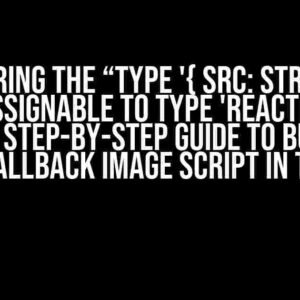As a Next.js developer, you’ve likely encountered the frustrating “any” type default in your TypeScript configuration. By default, Next.js enables the “any” type, which can lead to type errors and make your code more prone to bugs. But fear not, dear developer! In this article, we’ll delve into the world of TypeScript configuration and explore how to disable the “any” type by default in your Next.js project.
Why Disable “any” by Default?
Before we dive into the solution, let’s understand why disabling the “any” type is crucial for maintaining a robust and error-free codebase. When “any” is enabled, TypeScript allows variables and properties to be assigned any value, regardless of its type. This can lead to:
- Type errors and inconsistencies
- Difficulty in debugging and troubleshooting
- Weakened code quality and maintainability
- Potential security vulnerabilities
By disabling the “any” type, you ensure that your code adheres to strict type checking, which helps catch errors and inconsistencies at compile-time rather than runtime.
Understanding the `tsconfig.json` File
The `tsconfig.json` file is the heart of your TypeScript configuration. This file contains settings and compiler options that determine how TypeScript behaves. To disable the “any” type, we’ll focus on the `noImplicitAny` and `strict` compiler options.
The `noImplicitAny` Option
The `noImplicitAny` option is a boolean flag that, when set to `true`, raises an error when the type checker cannot infer the type of a variable or property. In other words, it forces you to explicitly define types for your variables and properties.
{
"compilerOptions": {
"noImplicitAny": true
}
}
The `strict` Option
The `strict` option is a meta-flag that enables a set of compiler options focused on type safety and code quality. When set to `true`, it enables:
- `noImplicitAny`
- `noImplicitThis`
- `alwaysStrict`
- `strictNullChecks`
- `strictFunctionTypes`
- `strictPropertyInitialization`
{
"compilerOptions": {
"strict": true
}
}
Disabling “any” by Default in Next.js
To disable the “any” type by default in your Next.js project, follow these steps:
- Create a `tsconfig.json` file in the root of your project (if you haven’t already).
- Add the following configuration to your `tsconfig.json` file:
{
"compilerOptions": {
"strict": true,
"noImplicitAny": true
}
}
By setting `strict` to `true`, we enable a set of type safety features, including `noImplicitAny`. This ensures that your code adheres to strict type checking, and the “any” type is disabled by default.
Troubleshooting and Best Practices
When disabling the “any” type, you may encounter errors and warnings in your code. Don’t worry! This is a normal part of the process. To troubleshoot and maintain a healthy codebase, follow these best practices:
- Explicitly define types for variables and properties
- Use type inference to let TypeScript infer types automatically
- Avoid using the `any` type explicitly
- Use the `unknown` type when dealing with unknown or dynamic data
- Regularly review and refactor your code to ensure type safety and consistency
| Scenario | Before (with “any” enabled) | After (with “any” disabled) |
|---|---|---|
| Variable declaration | let foo = 'bar'; |
let foo: string = 'bar'; |
| Function parameter | function greet(name) { ... } |
function greet(name: string) { ... } |
| Object property | const person = { name: 'John' }; |
interface Person { name: string }; const person: Person = { name: 'John' }; |
Conclusion
Disabling the “any” type by default in your Next.js project is a crucial step towards maintaining a robust, error-free, and maintainable codebase. By understanding the `tsconfig.json` file and configuring the `noImplicitAny` and `strict` options, you can ensure that your code adheres to strict type checking and avoid potential type errors. Remember to follow best practices, troubleshoot errors, and regularly review your code to ensure type safety and consistency.
By following this guide, you’ll be well on your way to creating a Next.js project that showcases the power of TypeScript and its ability to help you write better, more maintainable code.
Happy coding!
Here are 5 Questions and Answers about “Next JS disable ‘any’ by default / TypeScript”:
Frequently Asked Question
Get the lowdown on Next JS and TypeScript, and learn how to disable ‘any’ by default.
Why does Next JS allow ‘any’ type by default?
Next JS allows ‘any’ type by default to provide flexibility and ease of development. However, this can lead to type errors and make your code harder to maintain. Fortunately, you can disable ‘any’ type by default to ensure type safety and improve code quality.
How to disable ‘any’ type by default in Next JS?
To disable ‘any’ type by default in Next JS, you can add the following configuration to your `tsconfig.json` file: `”noImplicitAny”: true`. This will ensure that TypeScript will not infer the type ‘any’ for variables and properties unless you explicitly specify it.
What are the benefits of disabling ‘any’ type by default in Next JS?
Disabling ‘any’ type by default in Next JS provides several benefits, including improved code quality, reduced errors, and better maintainability. By specifying types explicitly, you can ensure that your code is more predictable, scalable, and easier to understand.
Will disabling ‘any’ type by default affect my existing Next JS project?
Disabling ‘any’ type by default will not affect your existing Next JS project, but it may require you to update your code to specify types explicitly. This can be a good opportunity to review and refactor your code to make it more maintainable and efficient.
Can I disable ‘any’ type by default for a specific file or module in Next JS?
Yes, you can disable ‘any’ type by default for a specific file or module in Next JS by using the `@typescript-eslint/no-explicit-any` rule in your `eslintrc.json` file. This will allow you to specify types explicitly for specific parts of your codebase.



